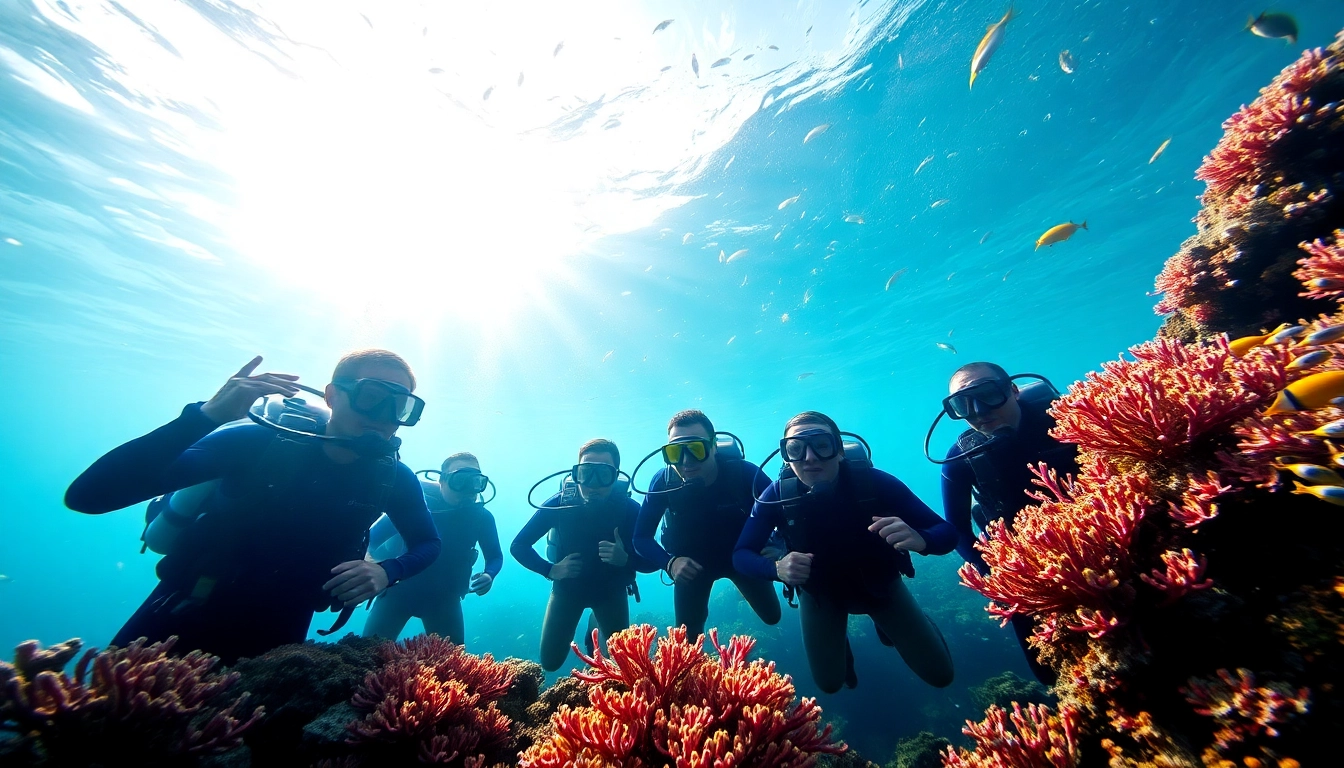Enhance Your Skills with a Bali Diving Course: An Essential Guide
Understanding the Bali Diving Course Landscape
Bali, often referred to as the Island of Gods, is more than just a tropical paradise. It has become a prime destination for water sports enthusiasts, particularly those interested in diving. The depth and diversity of marine life found in Bali’s crystal-clear waters is truly mesmerizing. A Bali diving course offers not only an exhilarating adventure but also a unique opportunity to explore underwater ecosystems that are among the richest in the world. In this comprehensive guide, we will delve into the myriad aspects of Bali diving courses, helping you make informed choices and maximize your diving experience.
Benefits of Taking a Bali Diving Course
Enrolling in a diving course in Bali comes with a multitude of benefits:
- Professional Instruction: Courses are often led by certified instructors who provide guidance, ensuring safety and enhancing your diving skills.
- Certification Opportunities: Completing a diving course can lead to internationally recognized certifications, allowing you to dive anywhere in the world.
- Connection with Nature: Diving allows you to experience the underwater world first-hand, fostering a deep appreciation for marine life and conservation efforts.
- Social Interaction: Diving courses create opportunities to meet new people, form friendships, and share memorable experiences with fellow divers.
- Skill Development: A structured course enables you to build essential skills progressively, from basic techniques to advanced diving practices.
Types of Courses Available in Bali
Bali offers a wide range of diving courses tailored to various skill levels and interests:
- Open Water Course: Ideal for beginners, this course often spans three days, covering theoretical knowledge and practical dives.
- Advanced Open Water Course: Designed for certified divers looking to enhance their skills, this course typically includes five adventure dives.
- Specialty Courses: These courses focus on specific skills or interests, such as night diving, deep diving, wreck diving, or underwater photography.
- Rescue Diver Course: This advanced course prepares divers to prevent and manage diving emergencies, emphasizing safety and awareness.
- Divemaster Course: For those looking to make diving a career, this course provides leadership training and operational knowledge of dive centers.
What to Expect from Your Bali Diving Course
Understanding what to anticipate during your Bali diving course can alleviate any potential anxieties:
- Comprehensive Theoretical Training: Expect structured lessons covering diving principles, equipment usage, and safety protocols.
- Practical Exercises: Sessions in the pool or confined water allow you to practice essential skills before venturing into open water.
- Guided Dives: Your instructor will accompany your dives, offering support and ensuring you apply what you’ve learned safely.
- Marine Conservation Awareness: Many courses also intertwine environmental education to instill a sense of responsibility towards ocean preservation.
Choosing the Right Bali Diving Course for You
Selecting the right course is critical to your diving journey. Here are some factors to consider:
Beginner vs. Advanced Courses
As a novice, opt for the Open Water Course, which focuses on the fundamentals of diving. This course equips you with the necessary knowledge and skills for safe diving. On the other hand, if you are already certified, the Advanced Open Water and specialty courses can enhance your diving proficiency, opening doors to more thrilling underwater adventures. Assess your current skill level and future aspirations to select the right fit.
Specialty Courses to Consider
In addition to foundational courses, specialty courses offer tailored experiences that can enhance your diving repertoire:
- Nitrox Diving: Use enriched air to extend bottom time and reduce nitrogen build-up in your body.
- Underwater Photography: Learn techniques to capture stunning underwater imagery.
- Wreck Diving: Explore captivating shipwrecks while understanding the history and significance behind them.
- Night Diving: Experience the underwater world in a whole new light, literally, as nocturnal marine life becomes active.
How to Evaluate Course Providers
Choosing a reliable and reputable course provider ensures a positive diving experience. Consider the following:
- Accreditation: Look for providers accredited by recognized diving organizations, which ensures adherence to safety and education standards.
- Instructor Qualifications: Check that instructors hold valid certifications and extensive teaching experience.
- Course Reviews: Research testimonials and reviews from past students for firsthand insights into the quality of training and overall experience.
- Equipment Quality: Ensure that the equipment is well-maintained and up-to-date, as this is crucial for safety.
Preparing for Your Bali Diving Course
Preparation is key to a successful diving experience. Here are essential steps to take:
Essential Gear and Equipment
While some diving schools provide gear, it’s advisable to familiarize yourself with essential diving equipment:
- Mask and Snorkel: A well-fitting mask and snorkel allow for clear vision and easy breathing on the surface.
- Wetsuit: Dependent on the dive conditions, a wetsuit protects against cold water and marine life.
- Buoyancy Control Device (BCD): This jacket-like device helps control your buoyancy underwater.
- Regulator: The regulator is crucial as it allows you to breathe the air from your tank at various depths.
Physical and Mental Preparation
Diving requires both physical fitness and mental readiness:
- Fitness Level: Regular exercise can enhance your stamina and overall fitness, which is beneficial for diving.
- Relaxation Techniques: Practice meditation or deep breathing to manage pre-dive anxiety effectively.
- Knowledge Review: Familiarize yourself with PADI (Professional Association of Diving Instructors) material or equivalent course content before your course begins.
Travel Tips for Bali Divers
While preparing for your diving course in Bali, consider these travel tips:
- Health Precautions: To dive safely, ensure you have no contraindicating medical conditions. Consider travel insurance that covers underwater activities.
- Accommodation: Choose lodging close to your diving school for convenience, especially for early morning dives.
- Local Culture: Research the local customs and regulations to respect the island’s traditions and practices.
During Your Bali Diving Course: Key Experiences
Your time spent during the course is filled with learning and exciting experiences:
What Happens Underwater
Diving in Bali is an adventure filled with vibrant marine life, encompassing colorful coral reefs, schools of tropical fish, and magnificent sea turtles. You will gain hands-on experience navigating through various underwater environments, all while being guided by experienced instructors who prioritize safety and skill development.
Classroom vs. Practical Diving Sessions
Your course will balance theory and practical application:
- Classroom Sessions: Engage in informative lessons covering critical concepts such as diving physics, equipment use, and safety protocols.
- Practical Training: Experience hands-on training through pool exercises and open-water dives to develop practical skills.
Safety Protocols and Best Practices
Safety is paramount in diving courses. Expect to learn and adhere to safety procedures, including:
- Buddy System: Always dive with a partner; this practice enhances safety and increases enjoyment.
- Pre-Dive Checks: Conduct equipment checks and safety reviews before every dive.
- Emergency Procedures: Understand emergency protocols and how to respond to varied diving scenarios.
Post-Course Considerations for Bali Diving Graduates
Once you complete your course, there are several steps to consider for continued growth in the diving community:
Continuing Your Diving Journey
Completing your Bali diving course is just the beginning. Consider further courses to hone and advance your skills. Specialty courses, such as deep diving or wreck diving, can enhance your experience and proficiency. Moreover, obtaining your Divemaster certificate allows you to take on more responsibilities in the diving community.
Building a Personal Diving Log
Keeping a logbook is essential for tracking your dives, noting skills practiced, and recording experiences. This log serves as documentation of your adventure, providing a valuable reference for future dives and aiding in certification pursuits.
Connecting with the Diving Community
Diving offers social opportunities for networking and building friendships. Join local dive clubs or online forums to share your experiences, seek advice, and connect with fellow divers worldwide.














Post Comment